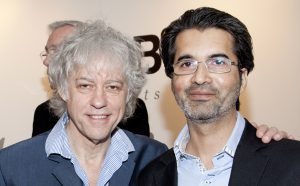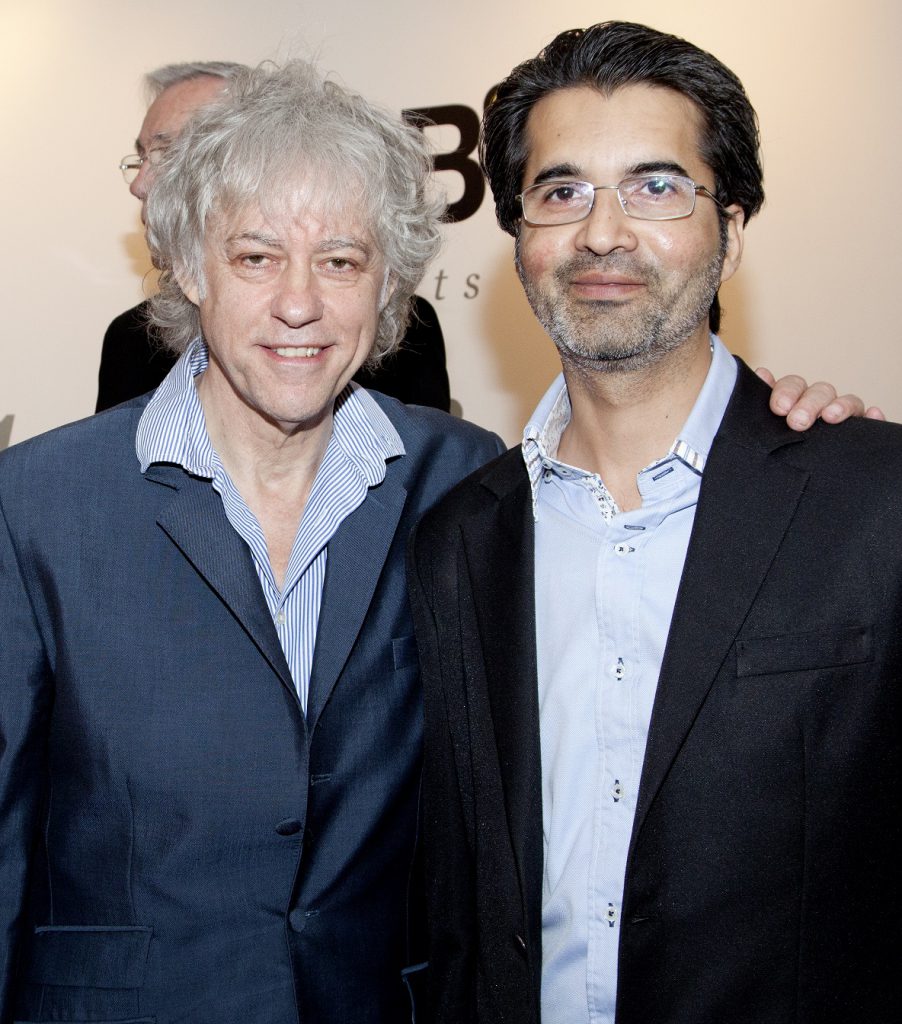Sir Bob Geldof on Creativity & Humanity
An Article By: Shoaib Qureshy
BE DDB & Bulls Eye

As a marketing and creative professional I attend a lot of straight jacketed conferences and talks. But none would compare to the recent colorful and insightful talk that I attended by Sir Bob Geldof on “Creativity and Humanity” in Dubai recently, courtesy DDB, to help inspire marketers in the region to better shape the society.
For those who are too young to know Sir Bob Geldof, let me first start off with a little biography of him.
Bob Geldof, 62 years old, is an Irish singer, songwriter, author, occasional actor and a political activist. He rose to prominence as the lead singer of the Irish rock band The Boomtown Rats in the late 1970s alongside the punk rock movement. He also starred in the 1982 film “Pink Floyd the Wall”. He is widely recognized for his activism especially anti-poverty efforts concerning Africa. In 1984 he co-founded the charity super group Band Aid to raise money for famine relief in Ethiopia. Then he went on to organize the charity super-concert Live Aid and the Live 8 concerts as well. He currently serves as an adviser to the ONE Campaign founded by fellow Irishman Bono (famous musician). He has been nominated for the Nobel Peace Prize and was granted an honorary knighthood by Queen Elizabeth and is a recipient of the Man of Peace title as well. He also featured on the Top 100 Britain’s List, something that he doesn’t understand why, as he is an Irishman… he says in his funny style.
So with these credentials you can see why this man himself is a living example of creativity and humanity himself. His talk was more like a peep inside his heart and mind and what drove him.
His earlier years were troubled and that impacted his life, hardly seven when his mother died of a brain hemorrhage. Self raised predominantly, as his father used to be away working as he managed to make ends meet. He started to develop love for music when he was very young and this eventually led him to a job as a music journalist in Canada as well. Upon returning to Ireland in 1975, he became the lead singer of the band The Boomtown Rats. In 1979, his band gained international renown with their second UK No. 1, “I Don’t Like Mondays”. Geldof wrote it in the aftermath of Brenda Ann Spencer’s attempted massacre at an elementary school across the street from her house in San Diego, California, at the beginning of 1979.
Geldof was very open in saying that he was always interested in politics even as a kid. He said that it was difficult not to be interested in politics if you were living in Ireland at that time. But he could not get into politics or impact it directly. And the only thing he knew or loved was music, so he used music to get into politics. If you just listen to all his famous songs (hits) they all have a political over tone or have been inspired by a political happening or have a political statement to make. All these songs came from the heart to him. But he never leaves an opportunity to pack a punch as he went on to say that “these hit songs are not the type that Pepsi would take. They would rather take my shitty stuff” indicating his anti corporate, anti establishment and blunt personality. The trait of his can be further judged from the fact that Boomtown Rats’ first appearance on Ireland’s The Late Night Show saw Geldof attacking Irish politicians and the Catholic Church which he blamed for many of the country’s problems at the time. This interview caused uproar across the country, making it impossible for the Boomtown Rats to play in Ireland again thereafter.
Geldof left the Boomtown Rats in 1986, to launch a solo career. His first solo record sold reasonably well and had hit single like “This Is the World Calling” and “The Great Song of Indifference”. He also occasionally performed with other artists, such as David Gilmour of Pink Floyd and Thin Lizzy. In 1992, he performed at the Freddie Mercurie Tribute concert with the surviving members of Queen at the old Wembley Stadium singing a song he had co-written with Mercury, called “Too Late God”. Just keep a watchful eye on all his famous song names (his deep down desire to use music to express his political feelings).
He says that his first taste of charity came in September 1981, when he performed as a solo artist for Amnesty International’s benefit show. Other rock artists had ‘planted a seed’ and that appeared to have affected Geldof. But it was in 1984, that Geldof responded to a BBC news report from Michael Buerk about the famine in Ethiopia by mobilizing the pop world to do something about the images he had seen. He explained with vivid detail that moment as he saw that news report on the 6’0 clock news with his wife and little daughter alongside. He saw a tear in his wife’s eye as well and he himself was moved from within. So with Midge Ure of Ultravox he wrote “Do they know it’s Christmas?” in order to raise funds. The song was recorded by various artists under the name of Band Aid.
In its first week of release the single became the UK’s fastest seller of all time, entering the chart at number one and going on to sell over three million copies, making it the biggest-selling single in UK history up to that point, a title it held for almost 13 years. The single was also a major US hit, peaking at No. 13 on the Billboard Hot 100. This song alone raised over £8 million.
As Geldof began to learn more about the famine situation, he discovered that one of the main reasons why African nations were in such dire peril was because of repayments on loans that their countries had taken from Western banks. For every pound donated in aid, ten times as much would have to leave the country in loan repayments. It became obvious that one song was not enough.
On 13 July 1985, Geldof and Ure organized Live Aid, the world’s biggest ever rock concert, staged simultaneously at the Wembley Stadium in London and John F Kennedy Stadium in Philadelphia. Thanks to an unprecedented decision by the BBC to clear its schedules for 16 hours of rock music, the event was also broadcast live in the UK on television and radio. It was one of the most monumental shows in history, with Phil Collins flying on a Concorde so that he could play at both Wembley and Philadelphia on the same day.
During the broadcast of Live Aid, Geldof shocked viewers into giving cash by not only twice mouthing profanities but also by slamming his fist on the table and ordering them not to go out to the pub but to stay in and watch the show. Nearly seven hours into the concert in London, Geldof gave an infamous interview in which he used the ‘F’ word again. The BBC presenter conducting the interview had attempted to provide a list of addresses to which potential donations should be sent; Geldof interrupted him in mid-flow and shouted: “@#$% the address, let’s get the phone numbers!” This has passed into folklore that he yelled at the audience as well, “Give us your @#$%^&* money!” although Geldof stated that this phrase was never uttered by him, in his sheepish smiling way. After the outburst, “giving” increased to £300 per second. And this outburst of Geldof has been spoofed in many movies and talk shows ever since.
In total, Live Aid raised over 150 million Pounds for famine relief. Geldof was subsequently knighted, at age 34, for his efforts. His autobiography, written soon after with Paul Valley was entitled Is That It? This book achieved further fame for being featured on the GCSE examination syllabus in a following year.
I can go on and on about this man as he is really inspirational. But I have to close this piece now. Just one thing before I conclude, on the sidelines of the talk I got to speak to him in detail and he had quite an eye on the Pakistan political scene. He enquired especially about Imran Khan and the Sharif’s and the recent elections.
But just to end, I think Geldof’s story has 3 key learning’s for everyone.
(i) Unless you make your mission, “really personal” you cannot get breakthrough success.
(ii) No matter what skill or talent God has gifted you, you can still use it to profoundly impact humanity.
(iii) Never for a minute doubt that one man cannot change the world, infact it’s the only thing that ever has.
So think about it and play your part in helping humanity in whatever you do.






 Posted On July 8 2025
Posted On July 8 2025